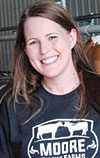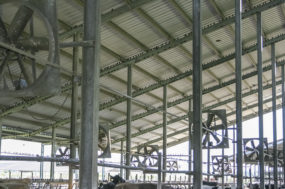Nothing beats the life of a farm kid. By the time our kids hit 3-year-old preschool (which is a thing in Iowa, a wonderful, wonderful thing), they know how to care for animals, they have a great sense of responsibility and, in the Moore house, they can make their own sandwich.
But how do we make sure that our little farmers are ready for formal education after years of learning in the barn or the calf pens? I remember going to kindergarten to learn my ABCs – my son came home from kindergarten last May able to read entire books. So much has changed since we were students! How does a busy dairy farming mama keep up with all the farm chores and keep the kiddos on track academically? Here are some tips:
1. Start early. Like really, really early. One of my favorite quotes is from William Butler Yeats: “Education is not the filling of a pail, but the lighting of the fire.” By lighting that fire as early as possible, we can continue the life-long journey of feeding the flame.
2. Narrate your day. Talking to your children (starting in infancy) promotes language development, the essential building block to success. Start by explaining the process of getting your baby dressed in the morning; continue by explaining the process of mixing milk replacer to your toddler; and move on to showing your preschooler how to milk cows in the parlor.
3. Don’t forget the basics. Make sure your child knows her full name and the names of both of her parents (beyond just Mom and Dad) before heading off to preschool.
4. Use what you have, where you are. Count cows in the parlor. Use eartags to work on number recognition. Cow names to identify letter sounds. Heck, we’ve even drawn numbers and letters in the sand stalls.
5. Set up your space. We listen to a lot of books on CD – Hank the Cow Dog, Little House on the Prairie and Harry Potter have been some of our favorites. We listen to the CDs while we work in the barn or ride in the car, and talk about what we are hearing. We’ve sacrificed some books to the barn, and the new favorite is the $10 we invested in chalkboard paint to paint a chalkboard on a piece of plywood for the kids to draw and practice letters. There are so many innovative ways that we can include even formal education into our life on the farm – just get creative!
6. Stay on top of milestones. Keep an eye on your child’s developmental milestones. The Centers for Disease Control and Prevention is just one website that has a list of where children should be at certain points in time. Keep your regular well child visits and discuss any concerns you may have with your pediatrician.
7. Remember the social skills. If you’d go to any preschool room, I can almost guarantee that the teacher would tell you skills like following directions, sitting quietly, being friendly, etc., are just as important for school preparation as numbers and letters and colors. Get in the habit of doing some of this formally at home before you send your child to a classroom. Practicing lining up at the front door on your way to the grocery store, sitting crisscross-applesauce to “read” a book before lunchtime and talking about what it means to be a good friend are ways to work on these skills in preparation for the classroom.
Remember, as you prepare your little farmer for a new world of formal education, that a solid foundation of curiosity, responsibility and a strong work ethic learned on the farm are among the best tools that we can give our children. If we can foster those skills, the hard part is done! ![]()
Heather Moore is a dairy farming mama herself, raising three little boys with her husband, Brandon. The Moore family has a 50-cow dairy and custom feeds 800 head of beef cattle near Maquoketa, Iowa. When she is not chasing around cows and kids, you'll find her volunteering, cooking and very occasionally, sleeping.
PHOTO: Painting a piece of plywood with chalkboard paint gives the Moore boys a learning tool. Photo provided by Heather Moore.




